KPMG's Management and Operations: Leadership and Managerial Functions
VerifiedAdded on 2023/01/06
|14
|4029
|46
Report
AI Summary
This report provides an in-depth analysis of leadership and management practices within KPMG, a multinational professional services network. It begins by defining and comparing the roles and characteristics of managers and leaders, highlighting their responsibilities in achieving organizational goals. The report then illustrates the application of these roles in various situational contexts, such as conflict resolution and employee motivation. Furthermore, it explores key managerial functions like planning, organizing, directing, and controlling, along with the application of Management by Objectives (MBO). The report also examines different leadership theories and models, including situational leadership, systems leadership, and contingency theory, and how KPMG utilizes them to maintain an effective workplace and adapt to market changes. Finally, the report discusses key approaches to operation management, the importance of operational management in achieving business objectives, and evaluates factors within the business environment that affect operational management and decision-making.
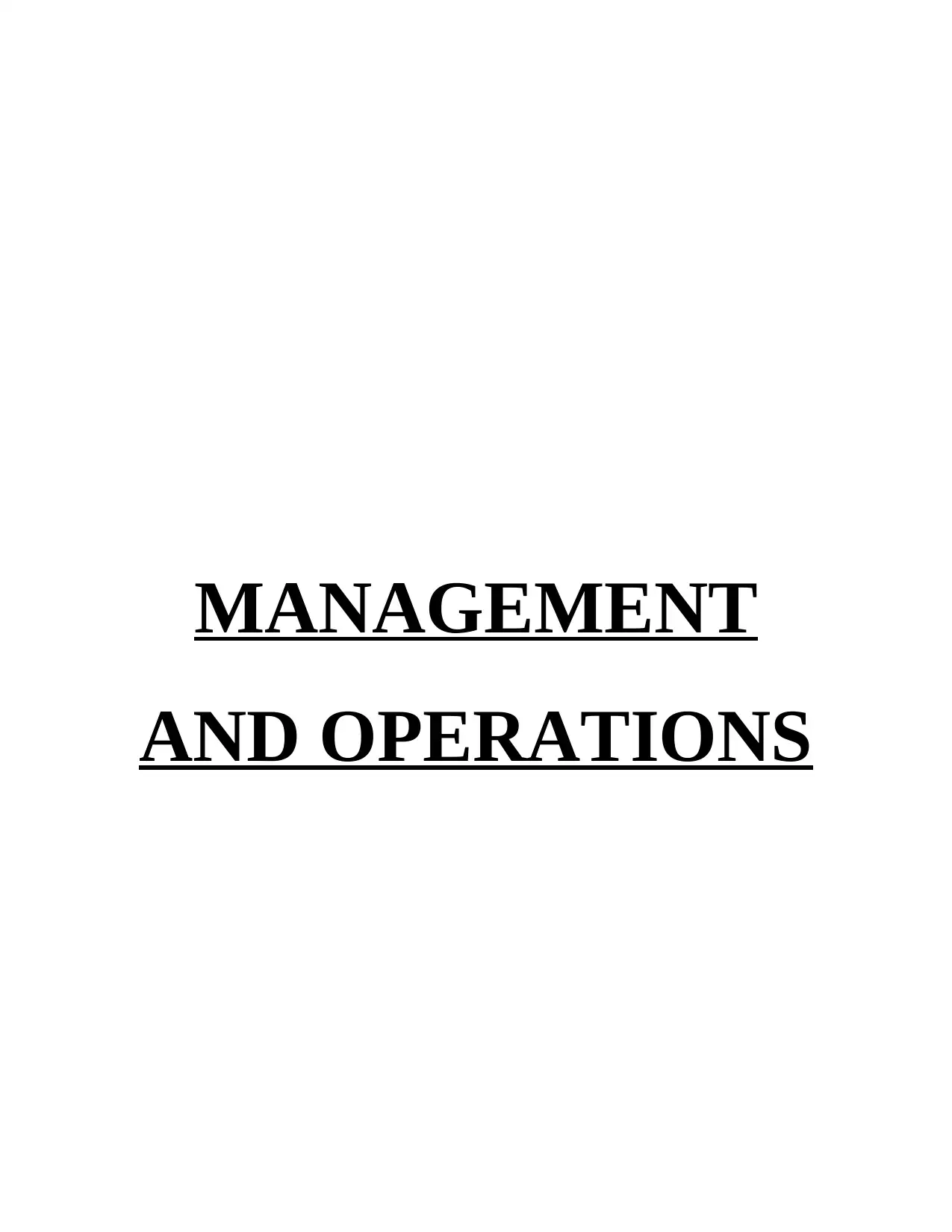
MANAGEMENT
AND OPERATIONS
AND OPERATIONS
Paraphrase This Document
Need a fresh take? Get an instant paraphrase of this document with our AI Paraphraser
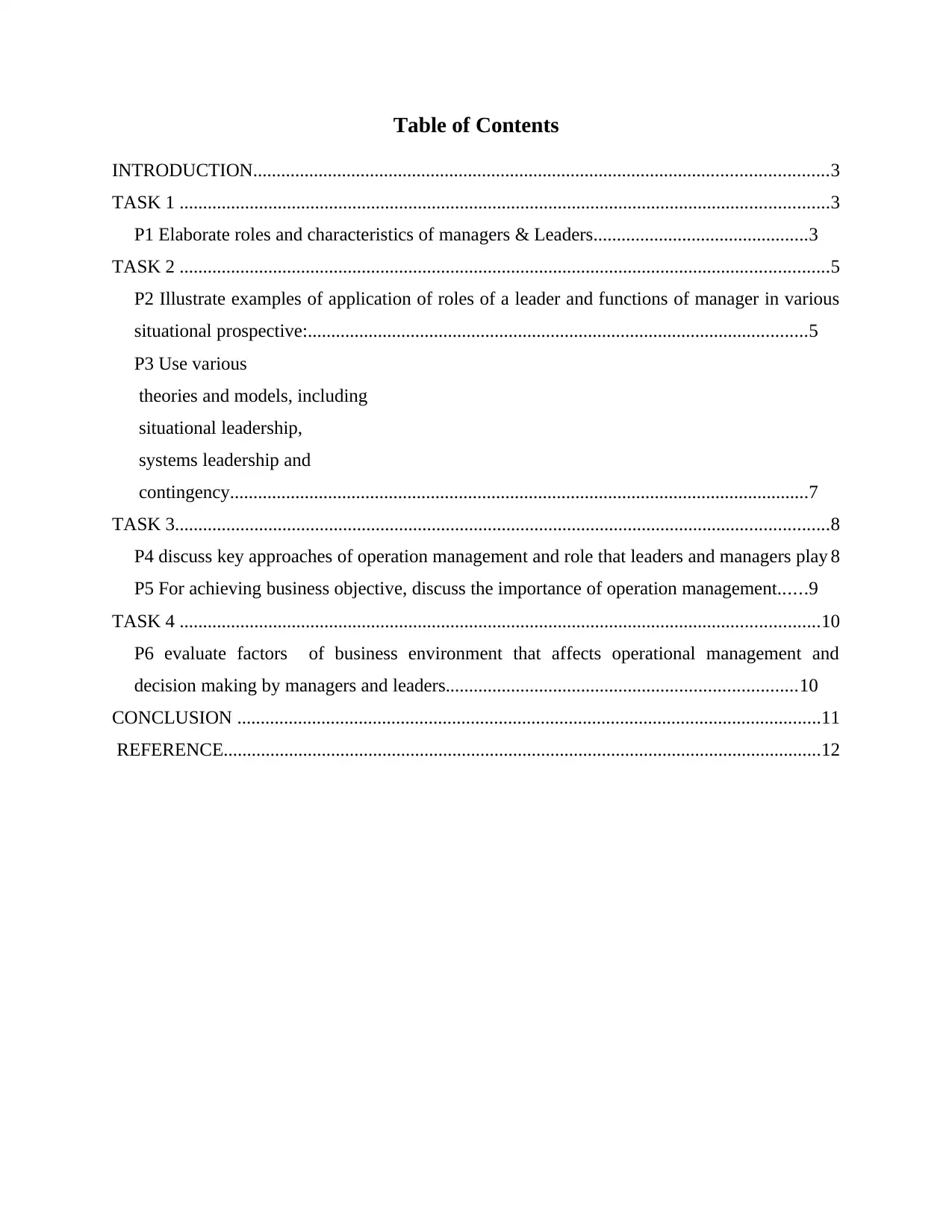
Table of Contents
INTRODUCTION...........................................................................................................................3
TASK 1 ...........................................................................................................................................3
P1 Elaborate roles and characteristics of managers & Leaders..............................................3
TASK 2 ...........................................................................................................................................5
P2 Illustrate examples of application of roles of a leader and functions of manager in various
situational prospective:...........................................................................................................5
P3 Use various
theories and models, including
situational leadership,
systems leadership and
contingency............................................................................................................................7
TASK 3............................................................................................................................................8
P4 discuss key approaches of operation management and role that leaders and managers play 8
P5 For achieving business objective, discuss the importance of operation management......9
TASK 4 .........................................................................................................................................10
P6 evaluate factors of business environment that affects operational management and
decision making by managers and leaders...........................................................................10
CONCLUSION .............................................................................................................................11
REFERENCE................................................................................................................................12
INTRODUCTION...........................................................................................................................3
TASK 1 ...........................................................................................................................................3
P1 Elaborate roles and characteristics of managers & Leaders..............................................3
TASK 2 ...........................................................................................................................................5
P2 Illustrate examples of application of roles of a leader and functions of manager in various
situational prospective:...........................................................................................................5
P3 Use various
theories and models, including
situational leadership,
systems leadership and
contingency............................................................................................................................7
TASK 3............................................................................................................................................8
P4 discuss key approaches of operation management and role that leaders and managers play 8
P5 For achieving business objective, discuss the importance of operation management......9
TASK 4 .........................................................................................................................................10
P6 evaluate factors of business environment that affects operational management and
decision making by managers and leaders...........................................................................10
CONCLUSION .............................................................................................................................11
REFERENCE................................................................................................................................12
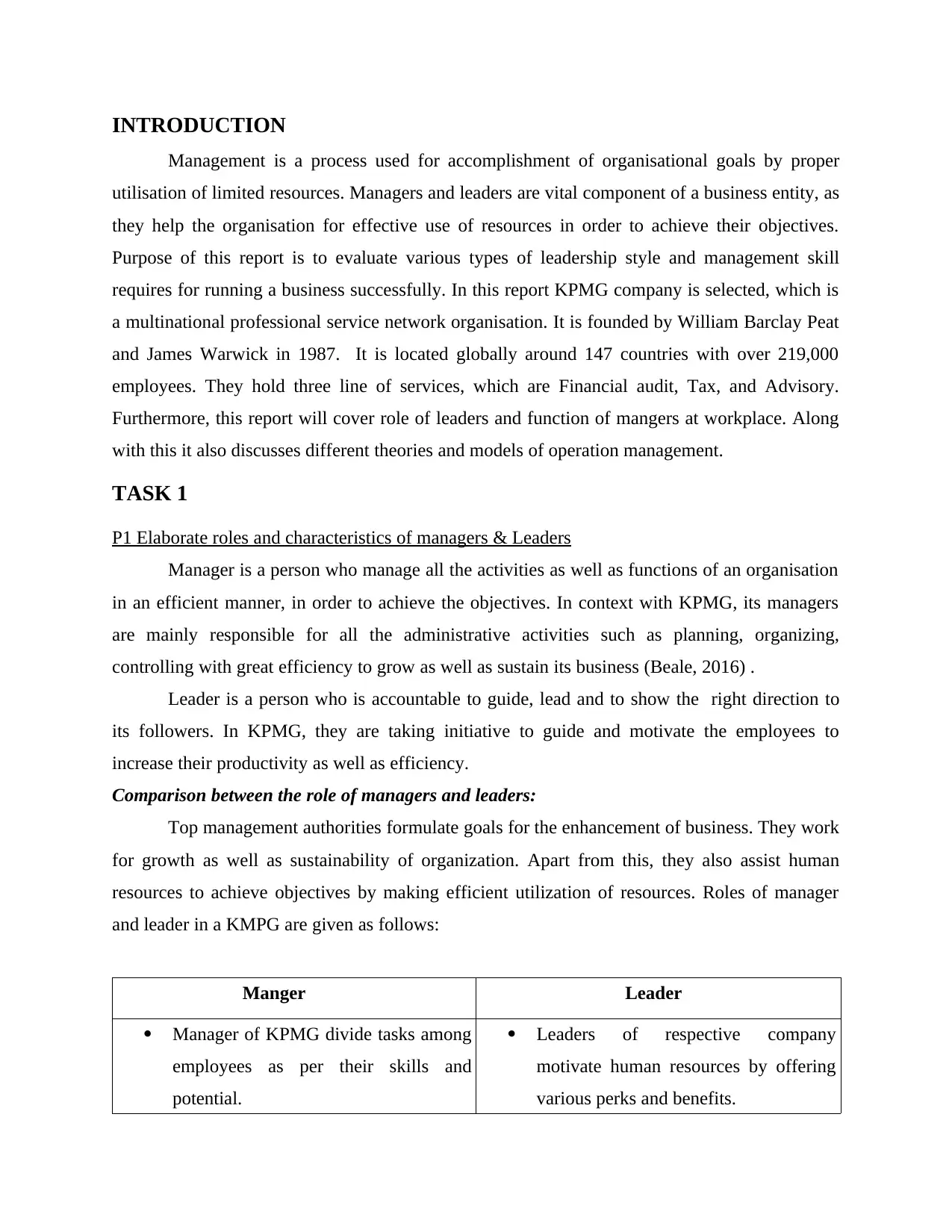
INTRODUCTION
Management is a process used for accomplishment of organisational goals by proper
utilisation of limited resources. Managers and leaders are vital component of a business entity, as
they help the organisation for effective use of resources in order to achieve their objectives.
Purpose of this report is to evaluate various types of leadership style and management skill
requires for running a business successfully. In this report KPMG company is selected, which is
a multinational professional service network organisation. It is founded by William Barclay Peat
and James Warwick in 1987. It is located globally around 147 countries with over 219,000
employees. They hold three line of services, which are Financial audit, Tax, and Advisory.
Furthermore, this report will cover role of leaders and function of mangers at workplace. Along
with this it also discusses different theories and models of operation management.
TASK 1
P1 Elaborate roles and characteristics of managers & Leaders
Manager is a person who manage all the activities as well as functions of an organisation
in an efficient manner, in order to achieve the objectives. In context with KPMG, its managers
are mainly responsible for all the administrative activities such as planning, organizing,
controlling with great efficiency to grow as well as sustain its business (Beale, 2016) .
Leader is a person who is accountable to guide, lead and to show the right direction to
its followers. In KPMG, they are taking initiative to guide and motivate the employees to
increase their productivity as well as efficiency.
Comparison between the role of managers and leaders:
Top management authorities formulate goals for the enhancement of business. They work
for growth as well as sustainability of organization. Apart from this, they also assist human
resources to achieve objectives by making efficient utilization of resources. Roles of manager
and leader in a KMPG are given as follows:
Manger Leader
Manager of KPMG divide tasks among
employees as per their skills and
potential.
Leaders of respective company
motivate human resources by offering
various perks and benefits.
Management is a process used for accomplishment of organisational goals by proper
utilisation of limited resources. Managers and leaders are vital component of a business entity, as
they help the organisation for effective use of resources in order to achieve their objectives.
Purpose of this report is to evaluate various types of leadership style and management skill
requires for running a business successfully. In this report KPMG company is selected, which is
a multinational professional service network organisation. It is founded by William Barclay Peat
and James Warwick in 1987. It is located globally around 147 countries with over 219,000
employees. They hold three line of services, which are Financial audit, Tax, and Advisory.
Furthermore, this report will cover role of leaders and function of mangers at workplace. Along
with this it also discusses different theories and models of operation management.
TASK 1
P1 Elaborate roles and characteristics of managers & Leaders
Manager is a person who manage all the activities as well as functions of an organisation
in an efficient manner, in order to achieve the objectives. In context with KPMG, its managers
are mainly responsible for all the administrative activities such as planning, organizing,
controlling with great efficiency to grow as well as sustain its business (Beale, 2016) .
Leader is a person who is accountable to guide, lead and to show the right direction to
its followers. In KPMG, they are taking initiative to guide and motivate the employees to
increase their productivity as well as efficiency.
Comparison between the role of managers and leaders:
Top management authorities formulate goals for the enhancement of business. They work
for growth as well as sustainability of organization. Apart from this, they also assist human
resources to achieve objectives by making efficient utilization of resources. Roles of manager
and leader in a KMPG are given as follows:
Manger Leader
Manager of KPMG divide tasks among
employees as per their skills and
potential.
Leaders of respective company
motivate human resources by offering
various perks and benefits.
⊘ This is a preview!⊘
Do you want full access?
Subscribe today to unlock all pages.

Trusted by 1+ million students worldwide
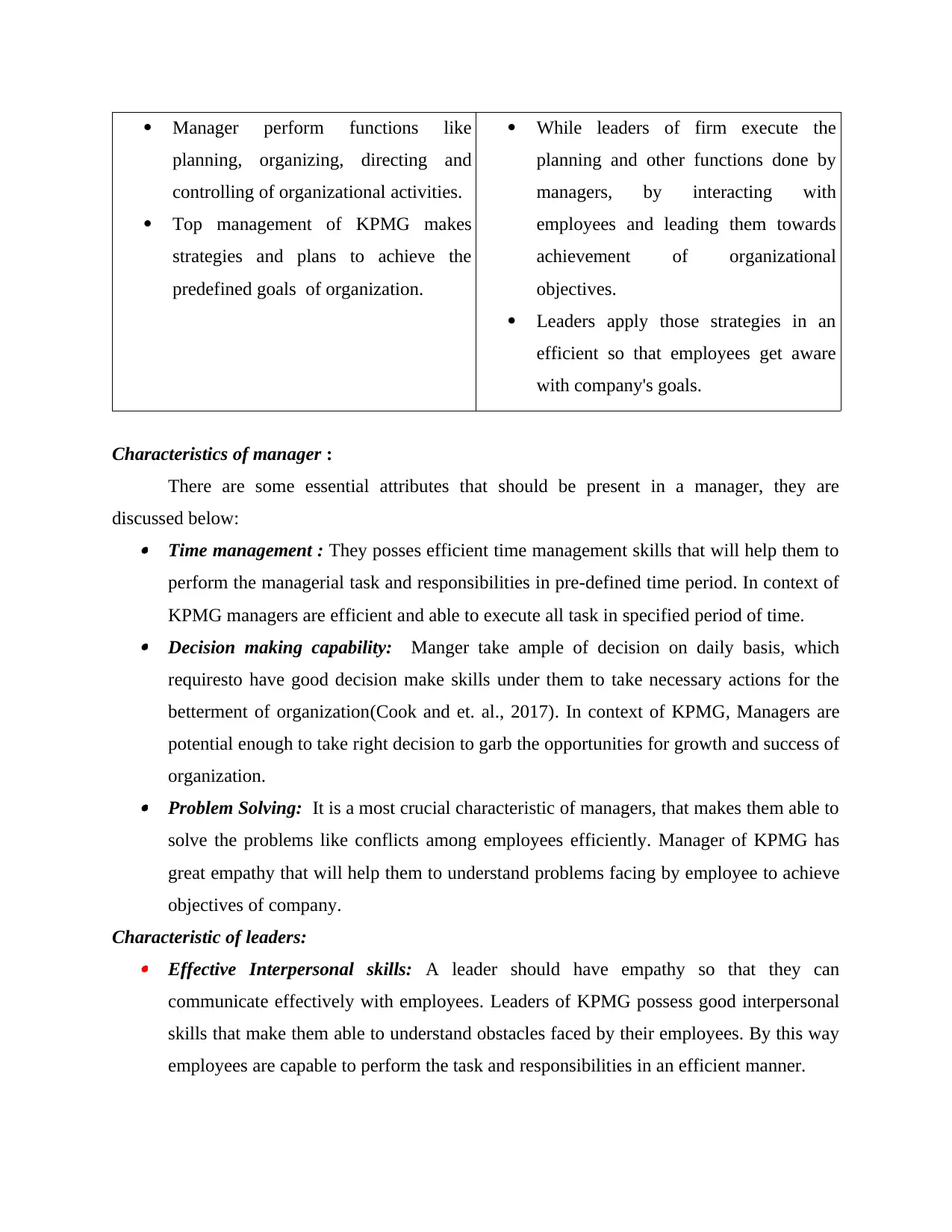
Manager perform functions like
planning, organizing, directing and
controlling of organizational activities.
Top management of KPMG makes
strategies and plans to achieve the
predefined goals of organization.
While leaders of firm execute the
planning and other functions done by
managers, by interacting with
employees and leading them towards
achievement of organizational
objectives.
Leaders apply those strategies in an
efficient so that employees get aware
with company's goals.
Characteristics of manager :
There are some essential attributes that should be present in a manager, they are
discussed below: Time management : They posses efficient time management skills that will help them to
perform the managerial task and responsibilities in pre-defined time period. In context of
KPMG managers are efficient and able to execute all task in specified period of time. Decision making capability: Manger take ample of decision on daily basis, which
requiresto have good decision make skills under them to take necessary actions for the
betterment of organization(Cook and et. al., 2017). In context of KPMG, Managers are
potential enough to take right decision to garb the opportunities for growth and success of
organization. Problem Solving: It is a most crucial characteristic of managers, that makes them able to
solve the problems like conflicts among employees efficiently. Manager of KPMG has
great empathy that will help them to understand problems facing by employee to achieve
objectives of company.
Characteristic of leaders: Effective Interpersonal skills: A leader should have empathy so that they can
communicate effectively with employees. Leaders of KPMG possess good interpersonal
skills that make them able to understand obstacles faced by their employees. By this way
employees are capable to perform the task and responsibilities in an efficient manner.
planning, organizing, directing and
controlling of organizational activities.
Top management of KPMG makes
strategies and plans to achieve the
predefined goals of organization.
While leaders of firm execute the
planning and other functions done by
managers, by interacting with
employees and leading them towards
achievement of organizational
objectives.
Leaders apply those strategies in an
efficient so that employees get aware
with company's goals.
Characteristics of manager :
There are some essential attributes that should be present in a manager, they are
discussed below: Time management : They posses efficient time management skills that will help them to
perform the managerial task and responsibilities in pre-defined time period. In context of
KPMG managers are efficient and able to execute all task in specified period of time. Decision making capability: Manger take ample of decision on daily basis, which
requiresto have good decision make skills under them to take necessary actions for the
betterment of organization(Cook and et. al., 2017). In context of KPMG, Managers are
potential enough to take right decision to garb the opportunities for growth and success of
organization. Problem Solving: It is a most crucial characteristic of managers, that makes them able to
solve the problems like conflicts among employees efficiently. Manager of KPMG has
great empathy that will help them to understand problems facing by employee to achieve
objectives of company.
Characteristic of leaders: Effective Interpersonal skills: A leader should have empathy so that they can
communicate effectively with employees. Leaders of KPMG possess good interpersonal
skills that make them able to understand obstacles faced by their employees. By this way
employees are capable to perform the task and responsibilities in an efficient manner.
Paraphrase This Document
Need a fresh take? Get an instant paraphrase of this document with our AI Paraphraser
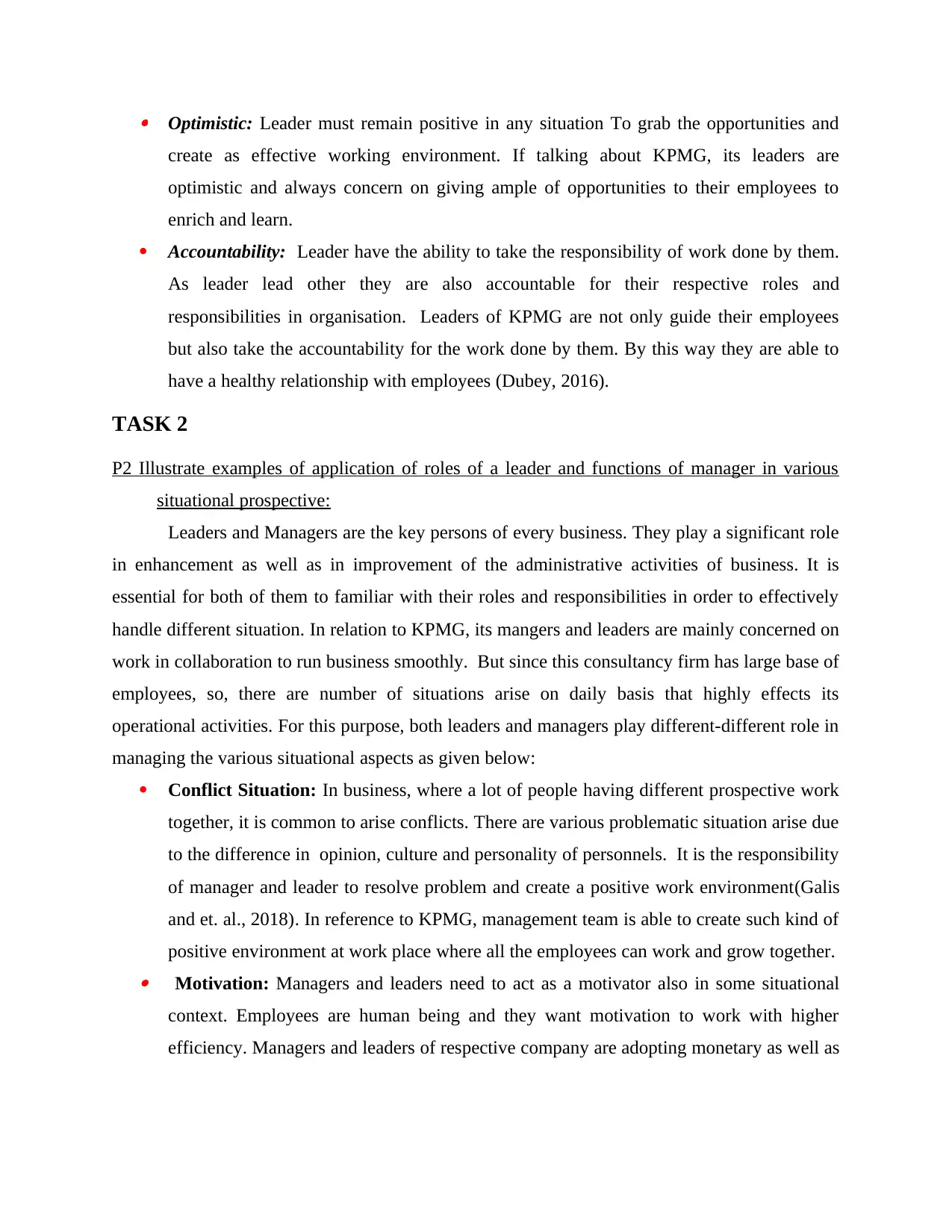
Optimistic: Leader must remain positive in any situation To grab the opportunities and
create as effective working environment. If talking about KPMG, its leaders are
optimistic and always concern on giving ample of opportunities to their employees to
enrich and learn.
Accountability: Leader have the ability to take the responsibility of work done by them.
As leader lead other they are also accountable for their respective roles and
responsibilities in organisation. Leaders of KPMG are not only guide their employees
but also take the accountability for the work done by them. By this way they are able to
have a healthy relationship with employees (Dubey, 2016).
TASK 2
P2 Illustrate examples of application of roles of a leader and functions of manager in various
situational prospective:
Leaders and Managers are the key persons of every business. They play a significant role
in enhancement as well as in improvement of the administrative activities of business. It is
essential for both of them to familiar with their roles and responsibilities in order to effectively
handle different situation. In relation to KPMG, its mangers and leaders are mainly concerned on
work in collaboration to run business smoothly. But since this consultancy firm has large base of
employees, so, there are number of situations arise on daily basis that highly effects its
operational activities. For this purpose, both leaders and managers play different-different role in
managing the various situational aspects as given below:
Conflict Situation: In business, where a lot of people having different prospective work
together, it is common to arise conflicts. There are various problematic situation arise due
to the difference in opinion, culture and personality of personnels. It is the responsibility
of manager and leader to resolve problem and create a positive work environment(Galis
and et. al., 2018). In reference to KPMG, management team is able to create such kind of
positive environment at work place where all the employees can work and grow together. Motivation: Managers and leaders need to act as a motivator also in some situational
context. Employees are human being and they want motivation to work with higher
efficiency. Managers and leaders of respective company are adopting monetary as well as
create as effective working environment. If talking about KPMG, its leaders are
optimistic and always concern on giving ample of opportunities to their employees to
enrich and learn.
Accountability: Leader have the ability to take the responsibility of work done by them.
As leader lead other they are also accountable for their respective roles and
responsibilities in organisation. Leaders of KPMG are not only guide their employees
but also take the accountability for the work done by them. By this way they are able to
have a healthy relationship with employees (Dubey, 2016).
TASK 2
P2 Illustrate examples of application of roles of a leader and functions of manager in various
situational prospective:
Leaders and Managers are the key persons of every business. They play a significant role
in enhancement as well as in improvement of the administrative activities of business. It is
essential for both of them to familiar with their roles and responsibilities in order to effectively
handle different situation. In relation to KPMG, its mangers and leaders are mainly concerned on
work in collaboration to run business smoothly. But since this consultancy firm has large base of
employees, so, there are number of situations arise on daily basis that highly effects its
operational activities. For this purpose, both leaders and managers play different-different role in
managing the various situational aspects as given below:
Conflict Situation: In business, where a lot of people having different prospective work
together, it is common to arise conflicts. There are various problematic situation arise due
to the difference in opinion, culture and personality of personnels. It is the responsibility
of manager and leader to resolve problem and create a positive work environment(Galis
and et. al., 2018). In reference to KPMG, management team is able to create such kind of
positive environment at work place where all the employees can work and grow together. Motivation: Managers and leaders need to act as a motivator also in some situational
context. Employees are human being and they want motivation to work with higher
efficiency. Managers and leaders of respective company are adopting monetary as well as
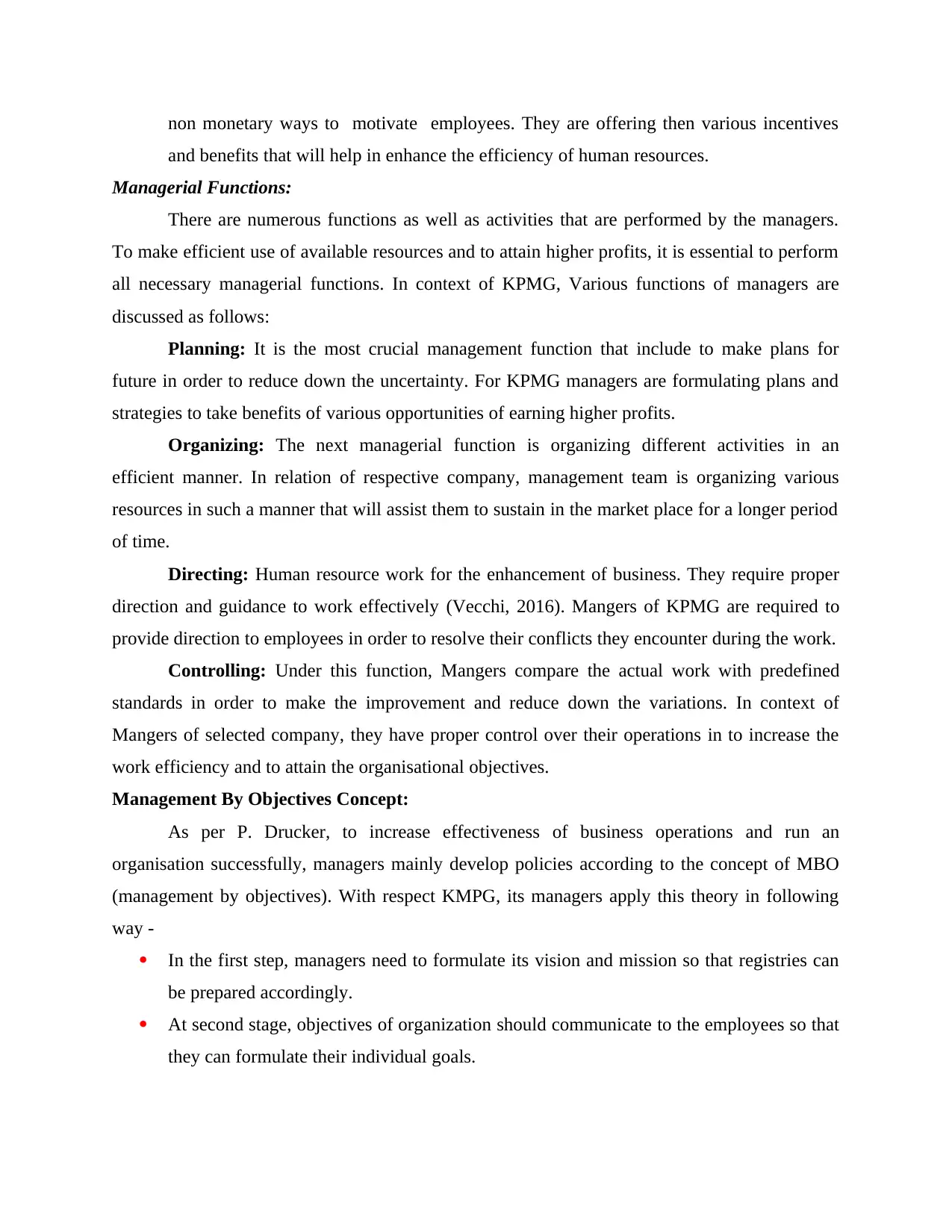
non monetary ways to motivate employees. They are offering then various incentives
and benefits that will help in enhance the efficiency of human resources.
Managerial Functions:
There are numerous functions as well as activities that are performed by the managers.
To make efficient use of available resources and to attain higher profits, it is essential to perform
all necessary managerial functions. In context of KPMG, Various functions of managers are
discussed as follows:
Planning: It is the most crucial management function that include to make plans for
future in order to reduce down the uncertainty. For KPMG managers are formulating plans and
strategies to take benefits of various opportunities of earning higher profits.
Organizing: The next managerial function is organizing different activities in an
efficient manner. In relation of respective company, management team is organizing various
resources in such a manner that will assist them to sustain in the market place for a longer period
of time.
Directing: Human resource work for the enhancement of business. They require proper
direction and guidance to work effectively (Vecchi, 2016). Mangers of KPMG are required to
provide direction to employees in order to resolve their conflicts they encounter during the work.
Controlling: Under this function, Mangers compare the actual work with predefined
standards in order to make the improvement and reduce down the variations. In context of
Mangers of selected company, they have proper control over their operations in to increase the
work efficiency and to attain the organisational objectives.
Management By Objectives Concept:
As per P. Drucker, to increase effectiveness of business operations and run an
organisation successfully, managers mainly develop policies according to the concept of MBO
(management by objectives). With respect KMPG, its managers apply this theory in following
way -
In the first step, managers need to formulate its vision and mission so that registries can
be prepared accordingly.
At second stage, objectives of organization should communicate to the employees so that
they can formulate their individual goals.
and benefits that will help in enhance the efficiency of human resources.
Managerial Functions:
There are numerous functions as well as activities that are performed by the managers.
To make efficient use of available resources and to attain higher profits, it is essential to perform
all necessary managerial functions. In context of KPMG, Various functions of managers are
discussed as follows:
Planning: It is the most crucial management function that include to make plans for
future in order to reduce down the uncertainty. For KPMG managers are formulating plans and
strategies to take benefits of various opportunities of earning higher profits.
Organizing: The next managerial function is organizing different activities in an
efficient manner. In relation of respective company, management team is organizing various
resources in such a manner that will assist them to sustain in the market place for a longer period
of time.
Directing: Human resource work for the enhancement of business. They require proper
direction and guidance to work effectively (Vecchi, 2016). Mangers of KPMG are required to
provide direction to employees in order to resolve their conflicts they encounter during the work.
Controlling: Under this function, Mangers compare the actual work with predefined
standards in order to make the improvement and reduce down the variations. In context of
Mangers of selected company, they have proper control over their operations in to increase the
work efficiency and to attain the organisational objectives.
Management By Objectives Concept:
As per P. Drucker, to increase effectiveness of business operations and run an
organisation successfully, managers mainly develop policies according to the concept of MBO
(management by objectives). With respect KMPG, its managers apply this theory in following
way -
In the first step, managers need to formulate its vision and mission so that registries can
be prepared accordingly.
At second stage, objectives of organization should communicate to the employees so that
they can formulate their individual goals.
⊘ This is a preview!⊘
Do you want full access?
Subscribe today to unlock all pages.

Trusted by 1+ million students worldwide
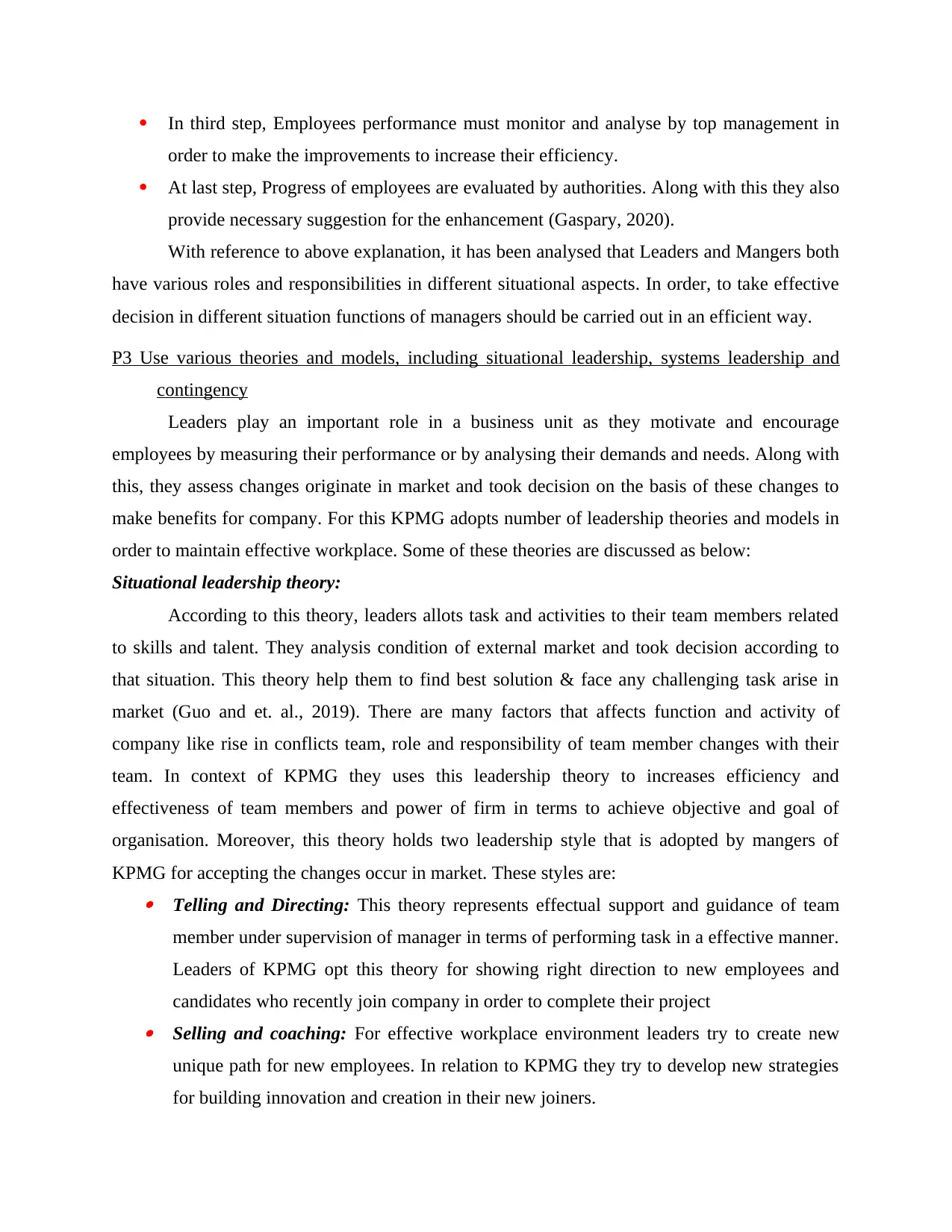
In third step, Employees performance must monitor and analyse by top management in
order to make the improvements to increase their efficiency.
At last step, Progress of employees are evaluated by authorities. Along with this they also
provide necessary suggestion for the enhancement (Gaspary, 2020).
With reference to above explanation, it has been analysed that Leaders and Mangers both
have various roles and responsibilities in different situational aspects. In order, to take effective
decision in different situation functions of managers should be carried out in an efficient way.
P3 Use various theories and models, including situational leadership, systems leadership and
contingency
Leaders play an important role in a business unit as they motivate and encourage
employees by measuring their performance or by analysing their demands and needs. Along with
this, they assess changes originate in market and took decision on the basis of these changes to
make benefits for company. For this KPMG adopts number of leadership theories and models in
order to maintain effective workplace. Some of these theories are discussed as below:
Situational leadership theory:
According to this theory, leaders allots task and activities to their team members related
to skills and talent. They analysis condition of external market and took decision according to
that situation. This theory help them to find best solution & face any challenging task arise in
market (Guo and et. al., 2019). There are many factors that affects function and activity of
company like rise in conflicts team, role and responsibility of team member changes with their
team. In context of KPMG they uses this leadership theory to increases efficiency and
effectiveness of team members and power of firm in terms to achieve objective and goal of
organisation. Moreover, this theory holds two leadership style that is adopted by mangers of
KPMG for accepting the changes occur in market. These styles are: Telling and Directing: This theory represents effectual support and guidance of team
member under supervision of manager in terms of performing task in a effective manner.
Leaders of KPMG opt this theory for showing right direction to new employees and
candidates who recently join company in order to complete their project Selling and coaching: For effective workplace environment leaders try to create new
unique path for new employees. In relation to KPMG they try to develop new strategies
for building innovation and creation in their new joiners.
order to make the improvements to increase their efficiency.
At last step, Progress of employees are evaluated by authorities. Along with this they also
provide necessary suggestion for the enhancement (Gaspary, 2020).
With reference to above explanation, it has been analysed that Leaders and Mangers both
have various roles and responsibilities in different situational aspects. In order, to take effective
decision in different situation functions of managers should be carried out in an efficient way.
P3 Use various theories and models, including situational leadership, systems leadership and
contingency
Leaders play an important role in a business unit as they motivate and encourage
employees by measuring their performance or by analysing their demands and needs. Along with
this, they assess changes originate in market and took decision on the basis of these changes to
make benefits for company. For this KPMG adopts number of leadership theories and models in
order to maintain effective workplace. Some of these theories are discussed as below:
Situational leadership theory:
According to this theory, leaders allots task and activities to their team members related
to skills and talent. They analysis condition of external market and took decision according to
that situation. This theory help them to find best solution & face any challenging task arise in
market (Guo and et. al., 2019). There are many factors that affects function and activity of
company like rise in conflicts team, role and responsibility of team member changes with their
team. In context of KPMG they uses this leadership theory to increases efficiency and
effectiveness of team members and power of firm in terms to achieve objective and goal of
organisation. Moreover, this theory holds two leadership style that is adopted by mangers of
KPMG for accepting the changes occur in market. These styles are: Telling and Directing: This theory represents effectual support and guidance of team
member under supervision of manager in terms of performing task in a effective manner.
Leaders of KPMG opt this theory for showing right direction to new employees and
candidates who recently join company in order to complete their project Selling and coaching: For effective workplace environment leaders try to create new
unique path for new employees. In relation to KPMG they try to develop new strategies
for building innovation and creation in their new joiners.
Paraphrase This Document
Need a fresh take? Get an instant paraphrase of this document with our AI Paraphraser
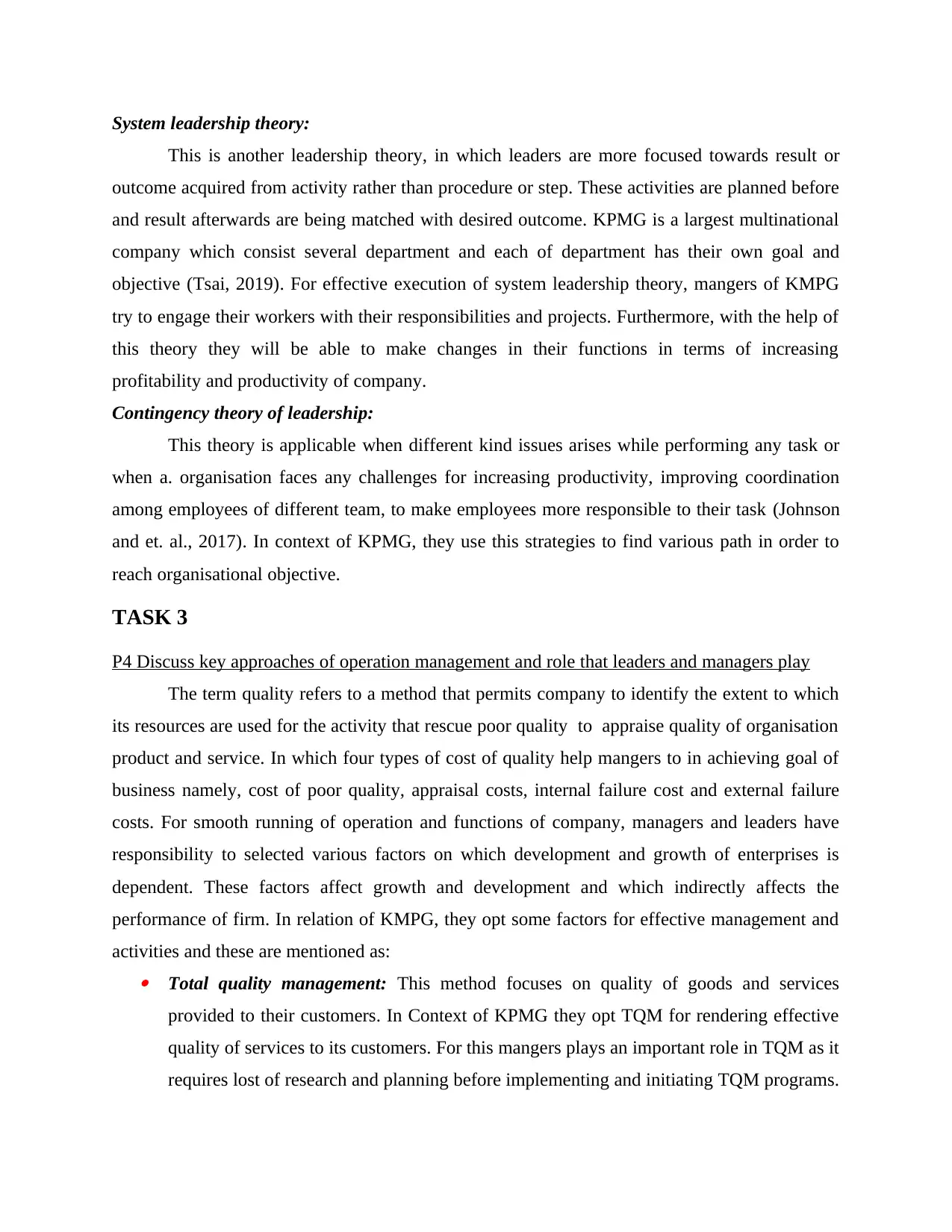
System leadership theory:
This is another leadership theory, in which leaders are more focused towards result or
outcome acquired from activity rather than procedure or step. These activities are planned before
and result afterwards are being matched with desired outcome. KPMG is a largest multinational
company which consist several department and each of department has their own goal and
objective (Tsai, 2019). For effective execution of system leadership theory, mangers of KMPG
try to engage their workers with their responsibilities and projects. Furthermore, with the help of
this theory they will be able to make changes in their functions in terms of increasing
profitability and productivity of company.
Contingency theory of leadership:
This theory is applicable when different kind issues arises while performing any task or
when a. organisation faces any challenges for increasing productivity, improving coordination
among employees of different team, to make employees more responsible to their task (Johnson
and et. al., 2017). In context of KPMG, they use this strategies to find various path in order to
reach organisational objective.
TASK 3
P4 Discuss key approaches of operation management and role that leaders and managers play
The term quality refers to a method that permits company to identify the extent to which
its resources are used for the activity that rescue poor quality to appraise quality of organisation
product and service. In which four types of cost of quality help mangers to in achieving goal of
business namely, cost of poor quality, appraisal costs, internal failure cost and external failure
costs. For smooth running of operation and functions of company, managers and leaders have
responsibility to selected various factors on which development and growth of enterprises is
dependent. These factors affect growth and development and which indirectly affects the
performance of firm. In relation of KMPG, they opt some factors for effective management and
activities and these are mentioned as: Total quality management: This method focuses on quality of goods and services
provided to their customers. In Context of KPMG they opt TQM for rendering effective
quality of services to its customers. For this mangers plays an important role in TQM as it
requires lost of research and planning before implementing and initiating TQM programs.
This is another leadership theory, in which leaders are more focused towards result or
outcome acquired from activity rather than procedure or step. These activities are planned before
and result afterwards are being matched with desired outcome. KPMG is a largest multinational
company which consist several department and each of department has their own goal and
objective (Tsai, 2019). For effective execution of system leadership theory, mangers of KMPG
try to engage their workers with their responsibilities and projects. Furthermore, with the help of
this theory they will be able to make changes in their functions in terms of increasing
profitability and productivity of company.
Contingency theory of leadership:
This theory is applicable when different kind issues arises while performing any task or
when a. organisation faces any challenges for increasing productivity, improving coordination
among employees of different team, to make employees more responsible to their task (Johnson
and et. al., 2017). In context of KPMG, they use this strategies to find various path in order to
reach organisational objective.
TASK 3
P4 Discuss key approaches of operation management and role that leaders and managers play
The term quality refers to a method that permits company to identify the extent to which
its resources are used for the activity that rescue poor quality to appraise quality of organisation
product and service. In which four types of cost of quality help mangers to in achieving goal of
business namely, cost of poor quality, appraisal costs, internal failure cost and external failure
costs. For smooth running of operation and functions of company, managers and leaders have
responsibility to selected various factors on which development and growth of enterprises is
dependent. These factors affect growth and development and which indirectly affects the
performance of firm. In relation of KMPG, they opt some factors for effective management and
activities and these are mentioned as: Total quality management: This method focuses on quality of goods and services
provided to their customers. In Context of KPMG they opt TQM for rendering effective
quality of services to its customers. For this mangers plays an important role in TQM as it
requires lost of research and planning before implementing and initiating TQM programs.
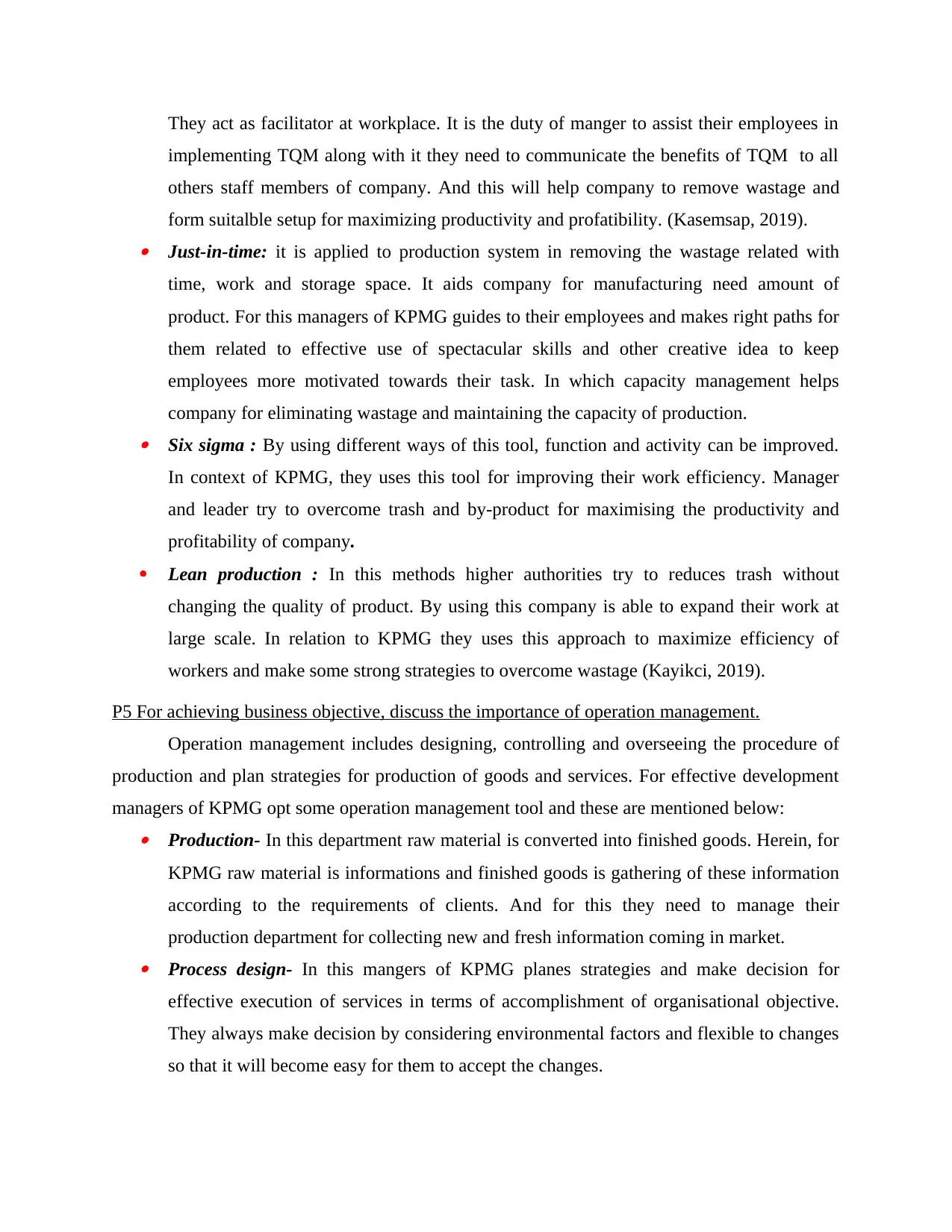
They act as facilitator at workplace. It is the duty of manger to assist their employees in
implementing TQM along with it they need to communicate the benefits of TQM to all
others staff members of company. And this will help company to remove wastage and
form suitalble setup for maximizing productivity and profatibility. (Kasemsap, 2019). Just-in-time: it is applied to production system in removing the wastage related with
time, work and storage space. It aids company for manufacturing need amount of
product. For this managers of KPMG guides to their employees and makes right paths for
them related to effective use of spectacular skills and other creative idea to keep
employees more motivated towards their task. In which capacity management helps
company for eliminating wastage and maintaining the capacity of production. Six sigma : By using different ways of this tool, function and activity can be improved.
In context of KPMG, they uses this tool for improving their work efficiency. Manager
and leader try to overcome trash and by-product for maximising the productivity and
profitability of company.
Lean production : In this methods higher authorities try to reduces trash without
changing the quality of product. By using this company is able to expand their work at
large scale. In relation to KPMG they uses this approach to maximize efficiency of
workers and make some strong strategies to overcome wastage (Kayikci, 2019).
P5 For achieving business objective, discuss the importance of operation management.
Operation management includes designing, controlling and overseeing the procedure of
production and plan strategies for production of goods and services. For effective development
managers of KPMG opt some operation management tool and these are mentioned below: Production- In this department raw material is converted into finished goods. Herein, for
KPMG raw material is informations and finished goods is gathering of these information
according to the requirements of clients. And for this they need to manage their
production department for collecting new and fresh information coming in market. Process design- In this mangers of KPMG planes strategies and make decision for
effective execution of services in terms of accomplishment of organisational objective.
They always make decision by considering environmental factors and flexible to changes
so that it will become easy for them to accept the changes.
implementing TQM along with it they need to communicate the benefits of TQM to all
others staff members of company. And this will help company to remove wastage and
form suitalble setup for maximizing productivity and profatibility. (Kasemsap, 2019). Just-in-time: it is applied to production system in removing the wastage related with
time, work and storage space. It aids company for manufacturing need amount of
product. For this managers of KPMG guides to their employees and makes right paths for
them related to effective use of spectacular skills and other creative idea to keep
employees more motivated towards their task. In which capacity management helps
company for eliminating wastage and maintaining the capacity of production. Six sigma : By using different ways of this tool, function and activity can be improved.
In context of KPMG, they uses this tool for improving their work efficiency. Manager
and leader try to overcome trash and by-product for maximising the productivity and
profitability of company.
Lean production : In this methods higher authorities try to reduces trash without
changing the quality of product. By using this company is able to expand their work at
large scale. In relation to KPMG they uses this approach to maximize efficiency of
workers and make some strong strategies to overcome wastage (Kayikci, 2019).
P5 For achieving business objective, discuss the importance of operation management.
Operation management includes designing, controlling and overseeing the procedure of
production and plan strategies for production of goods and services. For effective development
managers of KPMG opt some operation management tool and these are mentioned below: Production- In this department raw material is converted into finished goods. Herein, for
KPMG raw material is informations and finished goods is gathering of these information
according to the requirements of clients. And for this they need to manage their
production department for collecting new and fresh information coming in market. Process design- In this mangers of KPMG planes strategies and make decision for
effective execution of services in terms of accomplishment of organisational objective.
They always make decision by considering environmental factors and flexible to changes
so that it will become easy for them to accept the changes.
⊘ This is a preview!⊘
Do you want full access?
Subscribe today to unlock all pages.

Trusted by 1+ million students worldwide
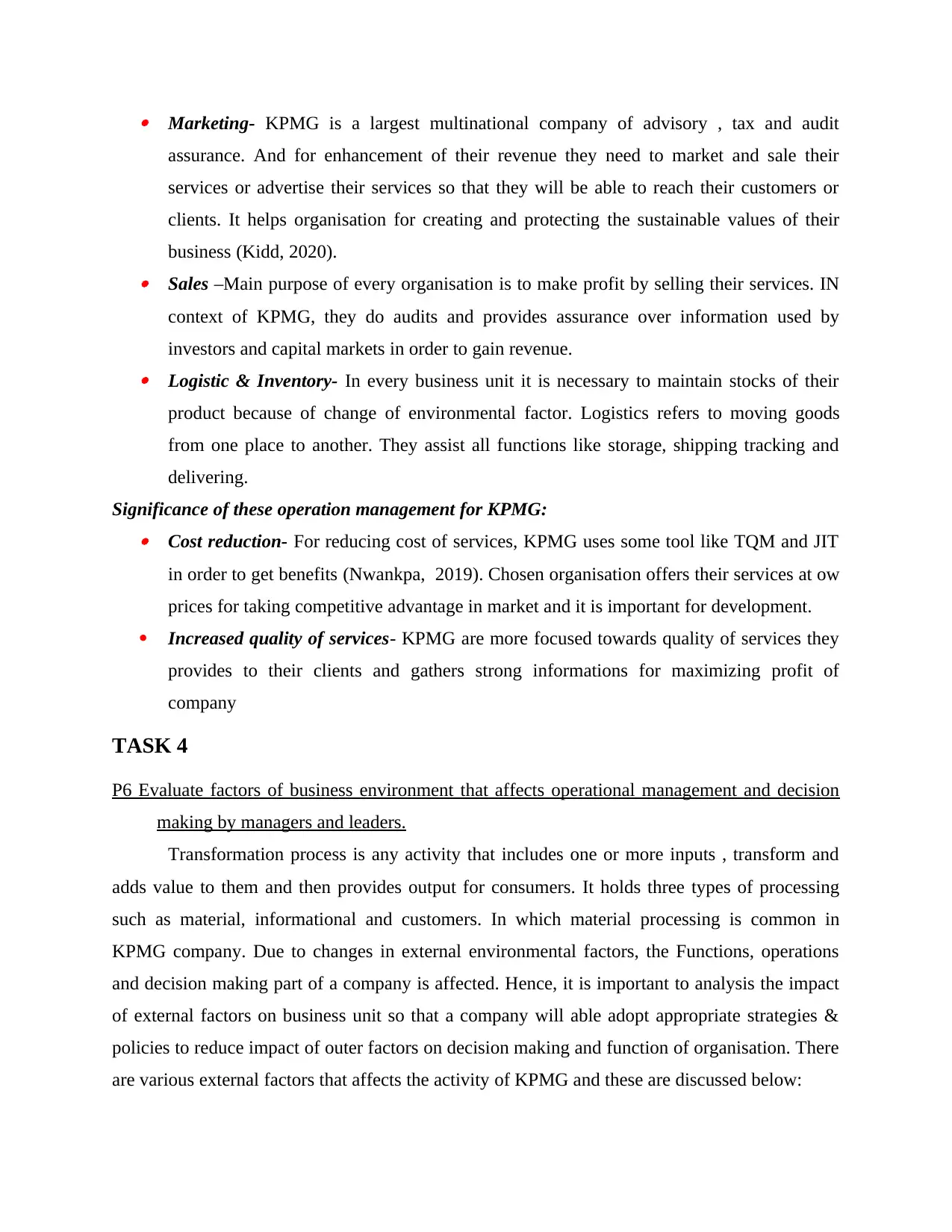
Marketing- KPMG is a largest multinational company of advisory , tax and audit
assurance. And for enhancement of their revenue they need to market and sale their
services or advertise their services so that they will be able to reach their customers or
clients. It helps organisation for creating and protecting the sustainable values of their
business (Kidd, 2020). Sales –Main purpose of every organisation is to make profit by selling their services. IN
context of KPMG, they do audits and provides assurance over information used by
investors and capital markets in order to gain revenue. Logistic & Inventory- In every business unit it is necessary to maintain stocks of their
product because of change of environmental factor. Logistics refers to moving goods
from one place to another. They assist all functions like storage, shipping tracking and
delivering.
Significance of these operation management for KPMG: Cost reduction- For reducing cost of services, KPMG uses some tool like TQM and JIT
in order to get benefits (Nwankpa, 2019). Chosen organisation offers their services at ow
prices for taking competitive advantage in market and it is important for development.
Increased quality of services- KPMG are more focused towards quality of services they
provides to their clients and gathers strong informations for maximizing profit of
company
TASK 4
P6 Evaluate factors of business environment that affects operational management and decision
making by managers and leaders.
Transformation process is any activity that includes one or more inputs , transform and
adds value to them and then provides output for consumers. It holds three types of processing
such as material, informational and customers. In which material processing is common in
KPMG company. Due to changes in external environmental factors, the Functions, operations
and decision making part of a company is affected. Hence, it is important to analysis the impact
of external factors on business unit so that a company will able adopt appropriate strategies &
policies to reduce impact of outer factors on decision making and function of organisation. There
are various external factors that affects the activity of KPMG and these are discussed below:
assurance. And for enhancement of their revenue they need to market and sale their
services or advertise their services so that they will be able to reach their customers or
clients. It helps organisation for creating and protecting the sustainable values of their
business (Kidd, 2020). Sales –Main purpose of every organisation is to make profit by selling their services. IN
context of KPMG, they do audits and provides assurance over information used by
investors and capital markets in order to gain revenue. Logistic & Inventory- In every business unit it is necessary to maintain stocks of their
product because of change of environmental factor. Logistics refers to moving goods
from one place to another. They assist all functions like storage, shipping tracking and
delivering.
Significance of these operation management for KPMG: Cost reduction- For reducing cost of services, KPMG uses some tool like TQM and JIT
in order to get benefits (Nwankpa, 2019). Chosen organisation offers their services at ow
prices for taking competitive advantage in market and it is important for development.
Increased quality of services- KPMG are more focused towards quality of services they
provides to their clients and gathers strong informations for maximizing profit of
company
TASK 4
P6 Evaluate factors of business environment that affects operational management and decision
making by managers and leaders.
Transformation process is any activity that includes one or more inputs , transform and
adds value to them and then provides output for consumers. It holds three types of processing
such as material, informational and customers. In which material processing is common in
KPMG company. Due to changes in external environmental factors, the Functions, operations
and decision making part of a company is affected. Hence, it is important to analysis the impact
of external factors on business unit so that a company will able adopt appropriate strategies &
policies to reduce impact of outer factors on decision making and function of organisation. There
are various external factors that affects the activity of KPMG and these are discussed below:
Paraphrase This Document
Need a fresh take? Get an instant paraphrase of this document with our AI Paraphraser
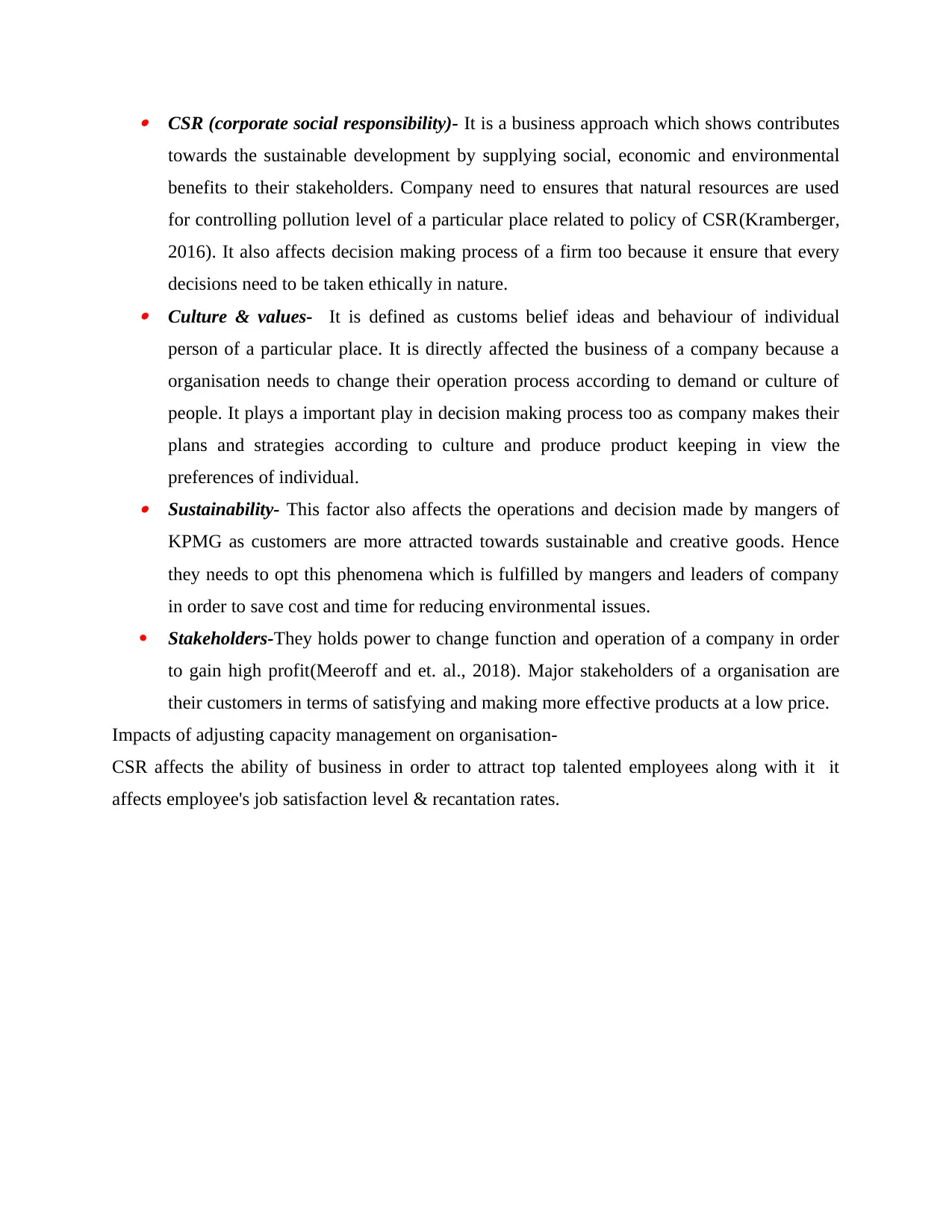
CSR (corporate social responsibility)- It is a business approach which shows contributes
towards the sustainable development by supplying social, economic and environmental
benefits to their stakeholders. Company need to ensures that natural resources are used
for controlling pollution level of a particular place related to policy of CSR(Kramberger,
2016). It also affects decision making process of a firm too because it ensure that every
decisions need to be taken ethically in nature. Culture & values- It is defined as customs belief ideas and behaviour of individual
person of a particular place. It is directly affected the business of a company because a
organisation needs to change their operation process according to demand or culture of
people. It plays a important play in decision making process too as company makes their
plans and strategies according to culture and produce product keeping in view the
preferences of individual. Sustainability- This factor also affects the operations and decision made by mangers of
KPMG as customers are more attracted towards sustainable and creative goods. Hence
they needs to opt this phenomena which is fulfilled by mangers and leaders of company
in order to save cost and time for reducing environmental issues.
Stakeholders-They holds power to change function and operation of a company in order
to gain high profit(Meeroff and et. al., 2018). Major stakeholders of a organisation are
their customers in terms of satisfying and making more effective products at a low price.
Impacts of adjusting capacity management on organisation-
CSR affects the ability of business in order to attract top talented employees along with it it
affects employee's job satisfaction level & recantation rates.
towards the sustainable development by supplying social, economic and environmental
benefits to their stakeholders. Company need to ensures that natural resources are used
for controlling pollution level of a particular place related to policy of CSR(Kramberger,
2016). It also affects decision making process of a firm too because it ensure that every
decisions need to be taken ethically in nature. Culture & values- It is defined as customs belief ideas and behaviour of individual
person of a particular place. It is directly affected the business of a company because a
organisation needs to change their operation process according to demand or culture of
people. It plays a important play in decision making process too as company makes their
plans and strategies according to culture and produce product keeping in view the
preferences of individual. Sustainability- This factor also affects the operations and decision made by mangers of
KPMG as customers are more attracted towards sustainable and creative goods. Hence
they needs to opt this phenomena which is fulfilled by mangers and leaders of company
in order to save cost and time for reducing environmental issues.
Stakeholders-They holds power to change function and operation of a company in order
to gain high profit(Meeroff and et. al., 2018). Major stakeholders of a organisation are
their customers in terms of satisfying and making more effective products at a low price.
Impacts of adjusting capacity management on organisation-
CSR affects the ability of business in order to attract top talented employees along with it it
affects employee's job satisfaction level & recantation rates.
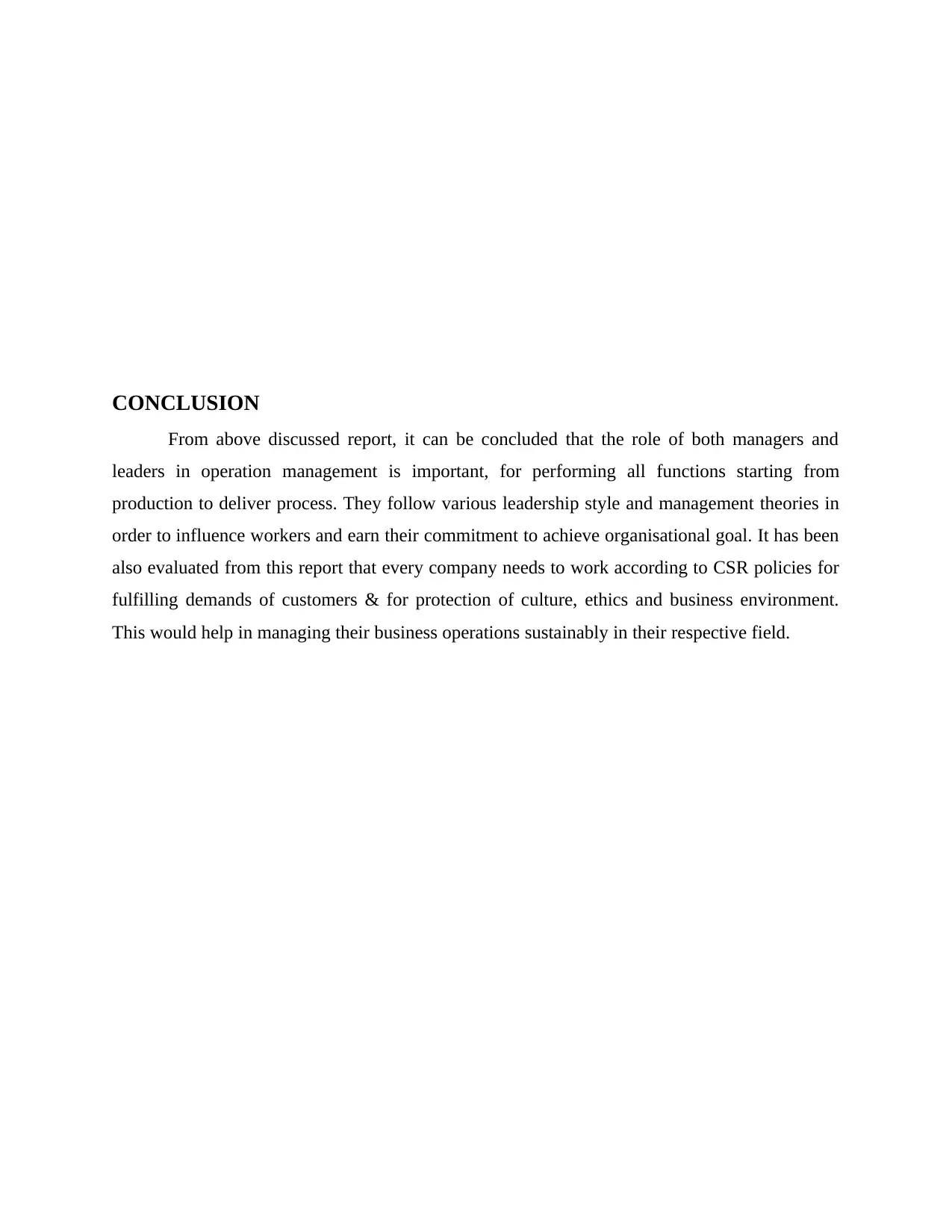
CONCLUSION
From above discussed report, it can be concluded that the role of both managers and
leaders in operation management is important, for performing all functions starting from
production to deliver process. They follow various leadership style and management theories in
order to influence workers and earn their commitment to achieve organisational goal. It has been
also evaluated from this report that every company needs to work according to CSR policies for
fulfilling demands of customers & for protection of culture, ethics and business environment.
This would help in managing their business operations sustainably in their respective field.
From above discussed report, it can be concluded that the role of both managers and
leaders in operation management is important, for performing all functions starting from
production to deliver process. They follow various leadership style and management theories in
order to influence workers and earn their commitment to achieve organisational goal. It has been
also evaluated from this report that every company needs to work according to CSR policies for
fulfilling demands of customers & for protection of culture, ethics and business environment.
This would help in managing their business operations sustainably in their respective field.
⊘ This is a preview!⊘
Do you want full access?
Subscribe today to unlock all pages.

Trusted by 1+ million students worldwide
1 out of 14
Related Documents
Your All-in-One AI-Powered Toolkit for Academic Success.
+13062052269
info@desklib.com
Available 24*7 on WhatsApp / Email
![[object Object]](/_next/static/media/star-bottom.7253800d.svg)
Unlock your academic potential
Copyright © 2020–2026 A2Z Services. All Rights Reserved. Developed and managed by ZUCOL.





